Redditor Allows Roommate With Dog In No-Pet Building, Now Gets Slammed With Fine
Finding an apartment that welcomes pets can feel like searching for a needle in a haystack. Even in cities teeming with apartment complexes, options that allow animals are often limited, expensive, or come with a string of restrictions.
For pet owners, this can turn the typically stressful process of finding a home into a near-herculean task. But what happens when you bend or outright break the rules to keep your furry friend with you?
One Reddit user recently shared a story that delves into the moral and financial repercussions of doing just that. When bending the rules becomes a sticky situation, who's to blame?
OP recently needed a new roommate for an upcoming lease term starting in June 2023. Enter Helen, a prospective roommate who also happened to have a dog.
Although their lease explicitly stated that dogs were not allowed, OP informed Helen that they wouldn't report the dog to the landlord. Helen decided to go along with it, signing the lease that clearly prohibited pets.
Fast forward a few months, and the landlord found out about the dog, slapping Helen and OP with daily fines and a flat fee. OP argues that they clearly told Helen about the no-pet policy and even offered a temporary solution.
But who bears the blame? Read the full story below and you be the judge:
OP asks:

OP recently needed a new roommate for an upcoming lease term starting in June 2023. Enter Helen, a prospective roommate who also happened to have a dog.
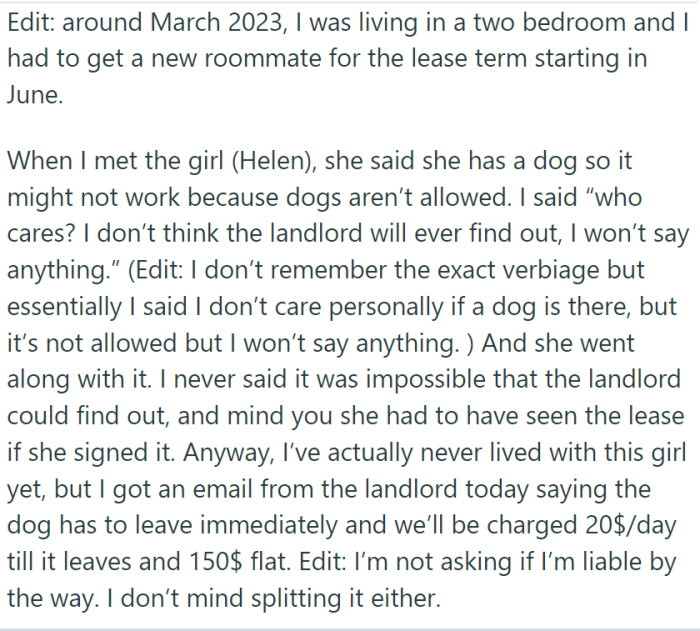
Fast forward a few months, and the landlord found out about the dog, slapping Helen and OP with daily fines and a flat fee.
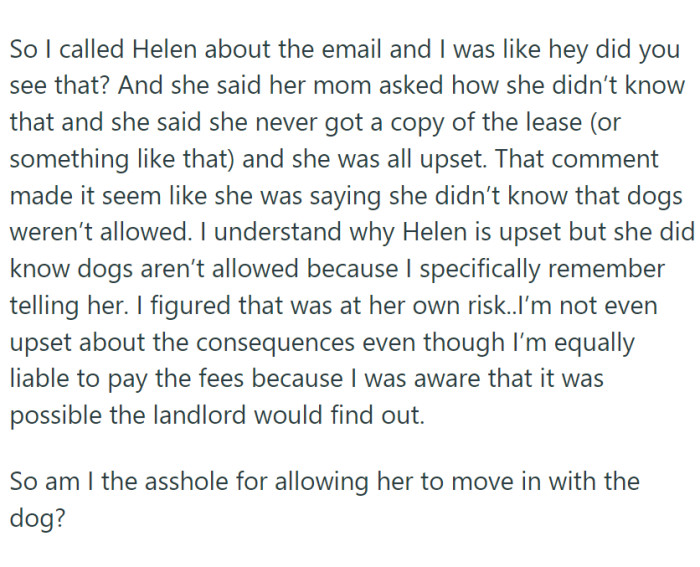
Understanding Rule-Breaking Behavior
Behavioral psychologists often note that bending rules, especially regarding pets, can stem from emotional attachment. Dr. Shawn Achor, a positive psychology researcher, states, "Our relationships with pets can significantly enhance our emotional well-being, often leading us to prioritize their needs over strict regulations." This sentiment is echoed by Dr. Paul Bloom, who emphasizes that "the emotional bonds we form with animals can create cognitive dissonance, where individuals rationalize their choices to ease feelings of guilt." Understanding these dynamics underscores the importance of addressing emotional needs within housing regulations. For more insights, visit Shawn Achor's website and Paul Bloom's website.
The Impact of Community Norms
Research from the University of Pennsylvania suggests that community norms significantly influence individual behavior regarding rule adherence. In pet-restrictive buildings, the perceived social pressure to conform can lead to secretive behaviors among pet owners.
This dynamic can create a cycle of guilt and anxiety, which may further alienate individuals from their community. Encouraging open dialogue about pet policies can help shift community norms towards more inclusive practices, fostering a supportive atmosphere for all residents.
Boundaries in Roommate Relationships
Establishing boundaries is essential in roommate situations, particularly when it comes to rules about pets in shared living spaces.
Research from the Journal of Social Issues indicates that unclear boundaries can lead to misunderstandings and conflict.
Setting clear expectations at the beginning can help prevent issues from arising later on.
OP posted some edits, and they show that her roommate knew about the pet policy.
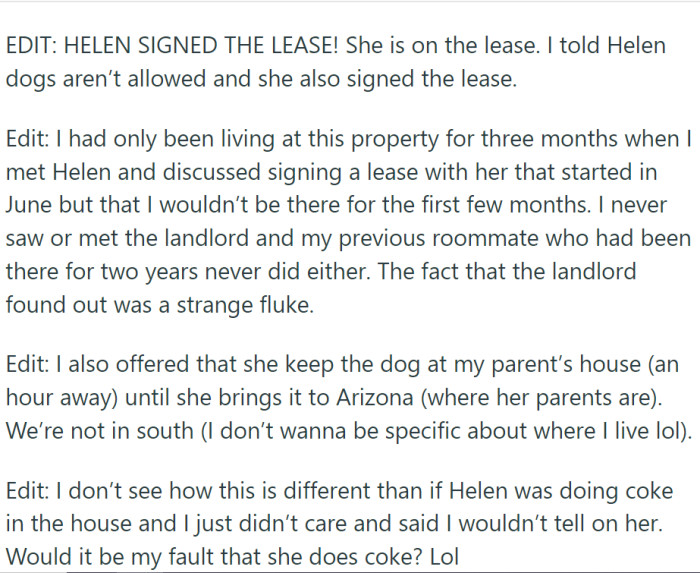
OP has offered the following explanation for why they think they might be the a-hole:

OP said she was okay, but she couldn't speak for the landlord.

Social psychologists emphasize that living in a no-pet building can lead to feelings of isolation for pet owners. According to Dr. Dan Gilbert, a renowned happiness researcher, "Pets can significantly enhance our social interactions and emotional well-being." Without a pet, individuals may find it challenging to forge social connections, which can result in increased loneliness and stress. Dr. Gilbert suggests that "encouraging pet-friendly policies can foster community engagement and improve psychological health for everyone involved."
When one roommate violates established rules, it can lead to feelings of betrayal and stress.
Psychologists suggest that addressing these feelings early and directly can prevent resentment from building up.
Using 'I' statements can facilitate a more constructive dialogue about boundary violations.
"Being an adult means taking responsibility for your own actions."
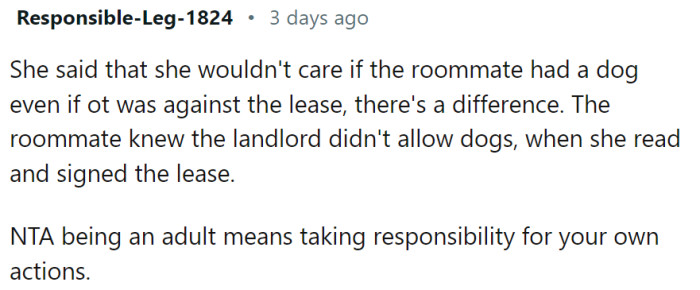
This Redditor is harsh on OP.

She tried to play the system and lost. No right to get angry.
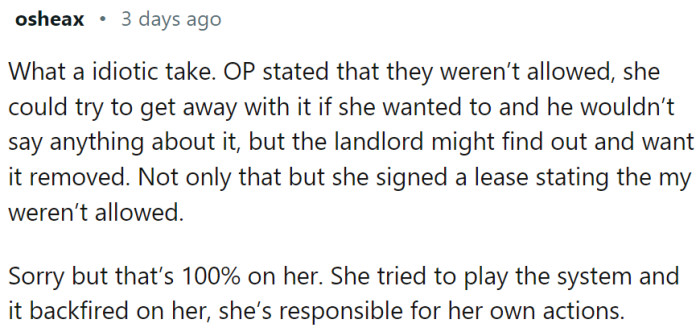
Practical Solutions for Pet Owners
Given the emotional challenges associated with pet ownership in restrictive environments, psychologists recommend proactive communication with landlords. Research suggests that transparent discussions about pet-related concerns can lead to more accommodating agreements.
For example, offering to pay a pet deposit or providing references from past landlords can help bridge gaps. These strategies not only demonstrate responsibility but also empower owners to advocate for their pet's place in their homes.
The Psychological Impact of Financial Penalties
Receiving unexpected fines can create financial and emotional stress, particularly in shared living situations.
Research shows that financial stress can exacerbate conflicts and lead to feelings of helplessness.
Understanding the implications of such penalties can help roommates approach discussions with empathy.
"She should have been more responsible."

"Her decision, her consequence; welcome to adulthood."
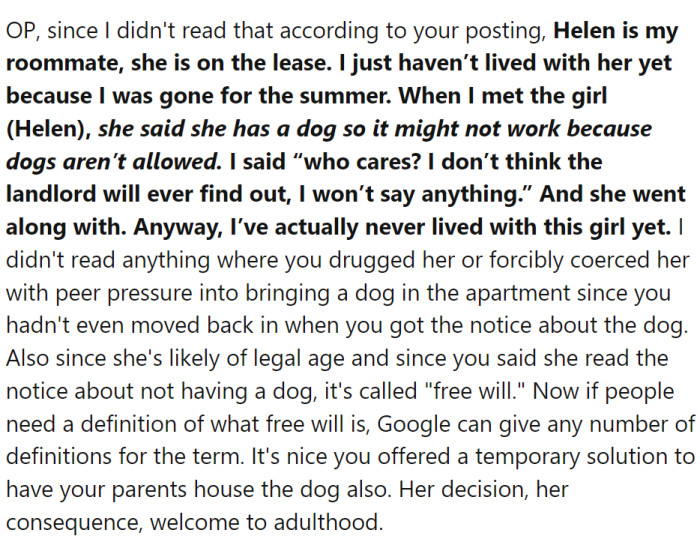
She was aware of the fact that dogs weren't allowed.
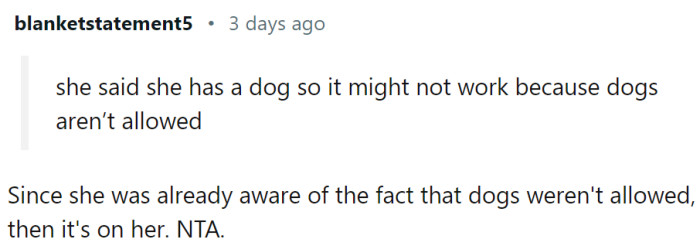
According to Dr. John Archer, a leading expert on human-animal bonds, the emotional attachment we have to pets can be profound. His research indicates that pets contribute to enhanced emotional resilience, often acting as stress buffers.
In stressful living situations, such as facing fines for unauthorized pets, this bond can lead to significant distress. Understanding this emotional landscape highlights the need for supportive housing policies that recognize the role of pets in mental health.
Creating a shared responsibility plan can help prevent similar situations in the future.
Experts recommend that roommates work together to outline their responsibilities and consequences for breaking rules.
This collaborative approach can foster a sense of teamwork and reduce the likelihood of conflict.
"Y’all need to learn how to read & abide by a contract."
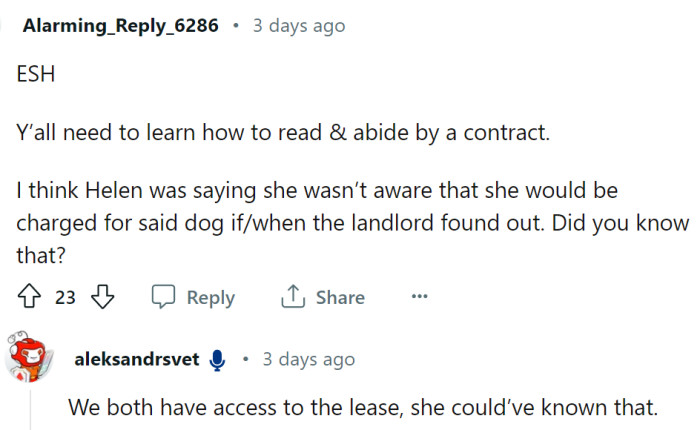
The bottom line is - she knew the risks.
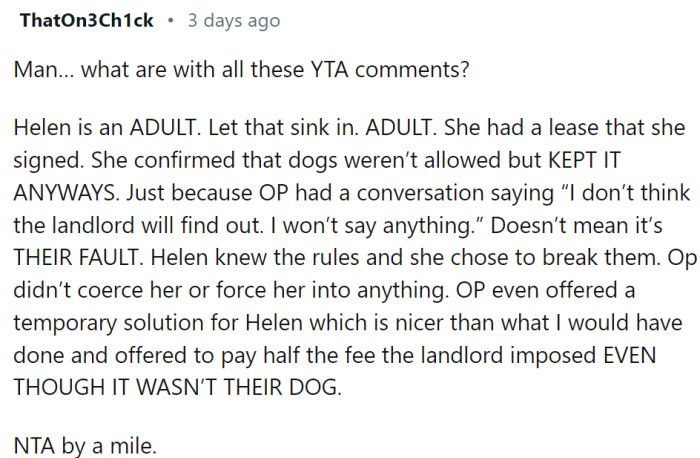
In this tangled situation, opinion seems to converge on one point: Helen, the roommate, is largely to blame. According to most Reddit users who commented on the story, the onus falls on her for knowingly violating a clear no-pet policy in the lease she signed.
Even though OP was aware and complicit, the majority opinion is that Helen took a calculated risk and must now face the financial consequences. This case underscores a broader issue.
When housing rules are bent or broken, the fallout can be messy, financially taxing, and potentially damaging to relationships. While it's tempting to bend the rules for convenience or companionship—be it human or animal—each decision comes with its own set of risks and responsibilities.
Both OP and Helen had options: seeking a pet-friendly apartment, making arrangements for temporary pet care, or, at the very least, carefully weighing the risks of violating the lease agreement.
Psychological Analysis
This situation highlights the importance of establishing clear expectations in shared living situations.
When boundaries are unclear, conflicts are more likely to arise, making proactive communication essential.
Analysis generated by AI
Analysis & Alternative Approaches
Effective communication and boundary-setting are crucial in maintaining harmony among roommates.
Recognizing the emotional implications of financial penalties can aid in fostering understanding and cooperation.
Psychological Analysis
This story demonstrates the potential pitfalls of not adhering strictly to rules, especially in shared living situations. Both roommates made choices against their better judgment, likely due to a combination of convenience, denial, and a desire to avoid conflict. However, these choices ultimately led to stress and financial repercussions, highlighting the importance of clear communication, accountability, and respect for established rules.
Analysis generated by AI
Understanding the Deeper Patterns
These psychological insights reveal the complexities of pet ownership in restrictive environments and the emotional turmoil it can create. By understanding the underlying motivations and community dynamics, we can advocate for policy changes that recognize the importance of pets in our lives.
As noted by the American Psychological Association, fostering supportive environments not only enhances individual well-being but also strengthens community bonds, leading to healthier living conditions for everyone.



